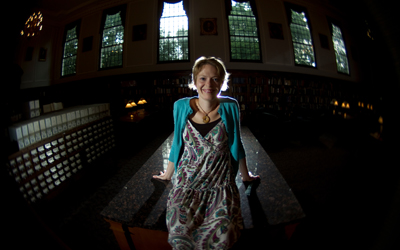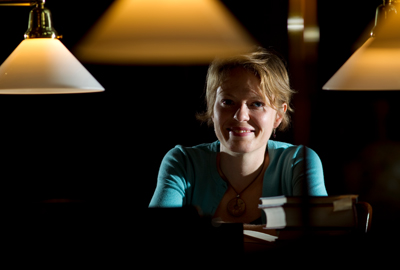Amy Anderson
Graduate Student Spotlight By Saraya Brewer
Photos by Mark Cornelison
Amy Anderson’s academic history has taken a sharp turn since her early undergrad pre-medical path. “We had to kill things in our lab class and that was the end of that,” she laughed. “I always liked to write – I went straight back to the English Department.”
Though she has studied English for close to a decade now, Anderson is quick to admit that her “academic ADD” still stands: “I can’t focus on a time period. I’m interested in anything you put in front of me.”
Her broad and varied interests make Anderson the perfect candidate for the brand new division of the University of Kentucky English department: Writing, Rhetoric and Digital Media. Anderson says she was excited about rhetoric, which is essentially the study of persuasion, from the first class she took on the topic. Because it isn’t limited to a certain time period, as many aspects of English are, the study offers a broad range of possibilities.

Her Master’s was on the 19th century American writer Harriett Prescott Spofford, a topic she enjoyed thoroughly, but with digital media becoming increasingly relevant for most any academic and professional field, the new division seemed like the perfect match to encompass her broad interests, which center on writing.
While Anderson is in the very early stages of her Ph.D. studies – the division being in the early stages itself – she helped organize and direct a notable course in India under the division’s umbrella this summer, alongside former UK instructor Kathy McCullough. With a strong focus on service learning – taking learning outside the classroom – the course, called Writers Without Borders: India, took 12 undergraduate students of various disciplines to Bawana, a poverty-stricken village outside New Delhi, India, to research and document the impact that Habitat for Humanity builds have had on the area.
>>Read more about this Writers Without Borders trip to India
“As far as we know, no one has done service learning this way before,” Anderson said, referring to the university’s unique partnership with a non-government organization. The benefits of the program are multi-tiered: the students benefit from the cultural immersion and the credit hours (they received an upper-level writing course credit and a cultural studies course), and the NGO benefits as well – with the audio, feature articles and photo essays that created during the course, the university team is actually producing a media package that Habitat for Humanity can potentially use for its website and magazine.
The Writers Without Borders course is just one example of how writing and digital media can join forces to create powerful persuasion for the emerging new division, which is spearheaded by professors Roxanne Mountford and Bill Endres. Anderson also serves as Endres’ research assistant, and will be assisting him in the upcoming project of digitizing the Wickliffe Bible, the first bible to be translated into English, and the St. Chad Gospel, an 8th-century illuminated gospel. The work has a personal meaning to Anderson, who plans to incorporate religious studies in her Ph.D. work.

“I want to work with the rhetoric of reconciliation within the church,” she said. “There’s a lot of different ways the church works with reconciliation – it could be people with the church, it could be people with God, it could be between various groups of people."
While she is still fleshing out the direction that study will take, Anderson is certain that this division is an important addition to the English curriculum at the University of Kentucky.
“Just being able to write a text – that’s the beginning, but there’s so much more that these students need to know how to do,” she said. “That’s why the writing program is expanding to include rhetoric and digital media.”
